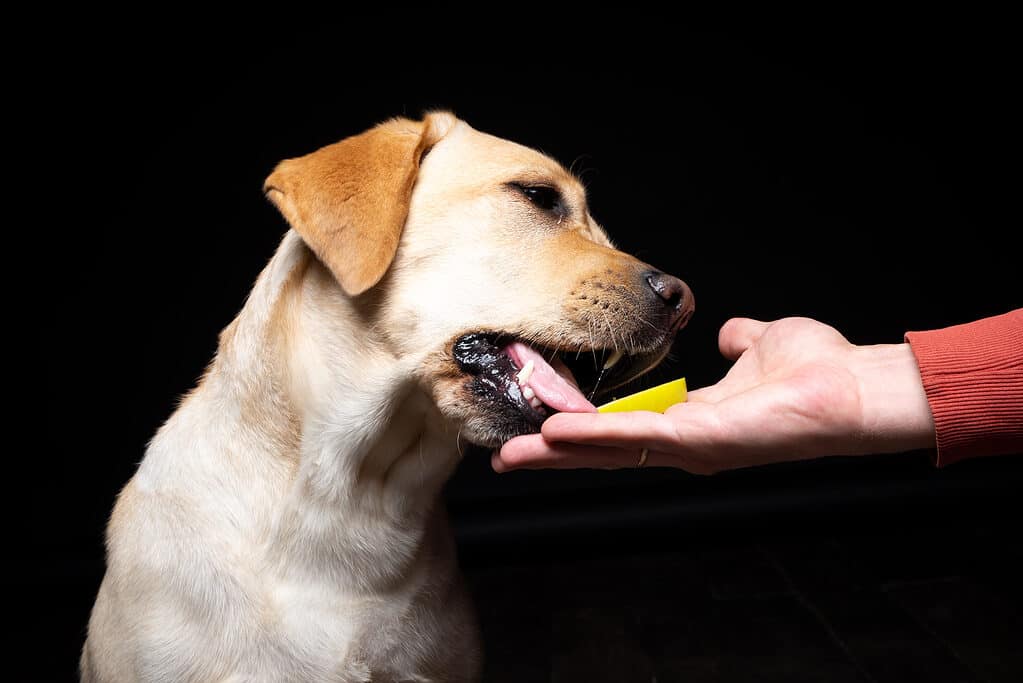Takis are a very popular Mexican-style snack that makes your mouth tingle with spice and heat. They are certainly delicious, but can dogs eat Takis too? After all, they’re just corn-based chips, right? Nope. Unfortunately, no matter how hard your dog begs feeding them fiery Takis is a bad idea.
Let’s take a closer look at why it’s not a good idea for dogs to eat Takis.
Can Dogs Eat Takis Safely?
No, dogs cannot eat Takis safely. Even though Takis are corn-based there are lots of other ingredients included which means they’re not suitable for dogs. Garlic and onion, salt, fat, and chili are all off the doggy menu and Takis are stuffed with them.
It’s best you eat the Takis and your dog has a healthy snack like a sliced apple or a few pieces of ripe bell pepper, but just a quick note, the ASPCA recommends treat foods make up no more than 10% of a dog’s daily diet, even if they are healthy snacks. The remaining 90% should be complete dog food.

Dogs cannot eat Takis safely so a healthy snack such as apple slices is a much better option.
©EVGENII LEONTEV/Shutterstock.com
What Are Takis?
Well known for their fiery heat, Takis are rolled corn tortilla chips that are hollow in the middle and served up in a bag.
They were first invented in 1999, originally in Mexico, but they’ve become very popular in the United States too, despite some claims that Takis caused stomach ulcers and gallstones. Takis are much like Flamin’ Hot Cheetos and they are available in a wide range of hot and spicy flavors. The hottest is allegedly Fuego which is Spanish for fire, and the coolest is Smokin’ Lime.
None of the range is suitable for dogs.

Takis are a spicy rolled corn snack that are hollow in the middle and served up in a bag.
©Diana Taliun/Shutterstock.com
Health Benefits of Takis
There are no health benefits for dogs, despite the fact they are made from corn which is a good source of carbohydrates, antioxidants, protein, fiber, and linoleic acids.
Corn is a healthy snack for dogs in moderation and the best way to serve it up is fresh corn off the cob. Tinned corn needs a good wash first to remove any brine or salt, then it can be mixed with their regular food or given as a snack.
Small pieces of sweetcorn in a puzzle toy, such as a Kong, are a good way of keeping anxious dogs occupied when you leave the house. Small pieces of soft corn are also great training aids.
However, corn-on-the-cob should never be given to dogs, because dogs can’t digest the cob (the grey inner core) and it becomes a blockage hazard if they can’t pass it in their stool.

Small pieces of sweet corn in a puzzle toy, such as a Kong, are a good way of keeping anxious dogs occupied when you leave the house.
©Valeriya Dzyuba/Shutterstock.com
Risks of Takis
There are many problems with Takis, so giving them to your dog is just not worth the risk. From upset stomachs to garlic poisoning, Takis are best kept as human food.
Here are the reasons why you should not give a dog Takis.
Salt
Takis are packed with salt and whilst we can process it, dogs are much smaller than us, so it takes much less than you think to make them ill.
Too much salt leads to hypertension (high blood pressure) in humans and dogs. In some cases, hypertension can cause blindness, detached retinas, tremors, collapse, nose bleeds, and heart murmurs.
Garlic and Onion
A major constituent ingredient in Takis are garlic and onions. These are really delicious flavorings for us, but they are toxic for dogs.
Dogs can’t metabolize any members of the allium family which includes leeks and shallots too. An allium compound called thiosulfate sticks to their red blood cells causing oxidative damage and hemolytic anemia. The symptoms are lethargy, pale gums, dark urine, and fast breathing.
Xylitol
Xylitol is an artificial sweetener that’s often used in low-sugar versions. It’s dangerous for dogs because it creates a big drop in blood sugar that can lead to hypoglycemia. Xylitol is an ingredient in a number foods including Jell-o, cakes, biscuits, junk foods, and juices. Xylitol poisoning ranges from gastric upset to tremors and it can be fatal.
Upset Stomach and Flatulence
Hot and spicy foods give dogs an upset stomach so in general they should be avoided. Takis are certainly spicy! Gas and diarrhoea are unpleasant for dogs. Bloating is painful and frequent diarrhoea can lead to dehydration.
Sore Mouth
That tingly feeling you get from Takis is delicious, but it’s not delicious for dogs who don’t understand why their mouth hurts. As a result, they can become distressed, paw at their mouths and drink excessive amounts of water.
High in Fat
Takis are junk food and they’re high in fat. Being overweight reduces your dog’s quality of life and it can lead to diseases like cancer and diabetes. According to the Association for Pet Obesity Prevention 56% of pet dogs are overweight or obese in the United States, so although it’s an avoidable problem it’s sadly common.
Pancreatitis
Pancreatitis is caused by fatty, oily foods. It’s a disease whereby the pancreas gets inflamed and releases food-digesting enzymes when they’re not needed. These enzymes then attack the pancreas. It’s very painful and once it’s happened, it’s likely to reoccur.

Takis are best kept as human food since they pose too many risks for your dog from upset stomachs to garlic poisoning.
©didesign021/Shutterstock.com
Are Takis Poisonous for Dogs?
Takis are smothered in ingredients that are really unsuitable for dogs and some can lead to poisoning such as garlic and onion powder, so even their mildest flavor Smokin Lime isn’t safe.
What Other Foods Can’t Dogs Eat?
As well as Takis there are other toxic food and drinks dogs should avoid. Let’s take a closer look:
Avocado
Avocado is filled with pectin and in large amounts, it can make dogs very unwell. There’s more pectin in the stone, rind, and leaves, but it’s best to avoid the flesh too.
Chocolate
Chocolate contains caffeine and theobromine which are stimulants that dogs can’t metabolize. Instead, they can overwhelm their body and lead to organ failure. Another hazard is the potential for Xylitol which we’ve already seen can be fatal for dogs.
Macadamia nuts
These sweet nuts contain indigestible compounds that can lead to organ failure. Macadamia nuts are baked into cakes and biscuits, prime snaffle foods from the kitchen counter, but they are toxic. One of the first macadamia nut poisoning signs is weak back legs.
Black walnuts
Black walnuts also contain indigestible toxic compounds and they grow a type of mold which is a neurotoxin for dogs. This mold causes tremors and collapse in dogs (and horses too).
Grapes
Grapes are dog toxic in all their forms including juice, raisins, and wine. Experts aren’t entirely sure what is is about grapes that causes organ failure, but they think it’s their tartaric acid.
Blue cheese
Blue cheese contains a type of mold called roquefortine C which dogs can be sensitive to, so it’s best to keep the Stilton out of reach because we all know how much dogs love cheese! Sickness symptoms include diarrhea, vomiting, tremors, and lethargy.
Alcohol
Any type of alcohol is toxic for dogs because it contains ethanol. Ethanol is found in wine, beer, ale, spirits, cocktail and alcohol-infused sweets.
My Dog Ate Takis What Should I Do?
Any dogs that snaffles Takis is likely to instantly regret it. Takis’ hot and spicy flavor is enough to put a dog off eating the whole packet, so it’s unlikely they will become seriously ill. Offer them lots of fresh clean water to wash off the spices and monitor them closely. If they show signs of excessive panting, tremors, weakness and lethargy call a vet for advice.
If the dog ate a whole lot of Takis they could develop poisoning symptoms or pancreatitis and become very unwell. In all poisoning cases getting veterinary advice quickly is essential. Not only is it much cheaper to treat, it can save your dog’s life.
Are Takis Safe For Dogs?
Overall, the answer is no. Takis are not safe for dogs to eat because they are flavored with toxic onion and garlic powder plus they contain lots of salt and fat that can lead to obesity, pancreatitis and hypertension.
There are so many other healthy snack options Takis shouldn’t ever feature on your dog’s menu.
Up Next
- Can Dogs Drink Beer, What About Other Alcohol?
- Can Your Dog Eat Whipped Cream (Puppaccinos) Safely?
- Can Dogs Eat Salad?
The photo featured at the top of this post is © Diana Taliun/Shutterstock.com
Ready to discover the top 10 cutest dog breeds in the entire world?
How about the fastest dogs, the largest dogs and those that are -- quite frankly -- just the kindest dogs on the planet? Each day, AZ Animals sends out lists just like this to our thousands of email subscribers. And the best part? It's FREE. Join today by entering your email below.
Sources
- USA Today, Available here: https://eu.usatoday.com/story/news/factcheck/2020/05/31/fact-check-spicy-snacks-like-takis-hot-cheetos-wont-cause-ulcers/5276050002/
- Takis, Available here: https://takis.ca/
- ASPCA, Available here: https://www.aspca.org/news/sharing-caring-foods-you-can-safely-share-your-pet
Thank you for reading! Have some feedback for us? Contact the AZ Animals editorial team.






